
Republicans and Democrats express overwhelmingly negative views of North Korea, but they diverge in opinions of several other countries – including Mexico, Iran, Russia and several U.S. allies.
Asked to rate their feelings toward 10 countries on a “feeling thermometer,” Republicans are more likely than Democrats to have “warmer” feelings toward just one: Russia. For six other countries – Canada, Germany, Mexico, India, China and Iran – Democrats offer warmer feelings than Republicans. Partisans give three countries – Britain, Japan and North Korea – similar ratings.
The new national survey by Pew Research Center, conducted July 30 to Aug. 12 among 4,581 adults, asks respondents for their feelings toward 10 foreign countries on a feeling thermometer ranging from 0 to 100. A rating of 51 or higher is “warm”; a rating below 50 is “cold”; a rating of 50 is neutral.
Democrats and Democratic-leaning independents give Canada an average rating of 76 on the 0-to-100 scale, highest among the 10 countries. On average, Republicans and Republican leaners rate Canada at 65, about the same rating they give to Britain (64). (For more on the public’s views of Canada and Mexico, see “Americans have mixed feelings toward Mexico, ‘warmer’ feelings toward Canada.”)
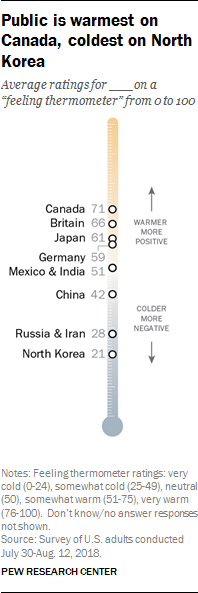
Republicans give four countries average ratings of 51 or higher: Canada (65), Britain (64), Japan (59) and Germany (54). Democrats give positive average ratings to six countries, including Mexico and India.
The widest partisan differences are in opinions about Mexico. The average thermometer rating for Mexico is 61 among Democrats and just 38 among Republicans.
And while Republicans and Democrats generally give both Iran and Russia “cold” ratings, there are sizable differences in views of both countries. The average rating for Iran is substantially higher among Democrats (34 average rating) than among Republicans (19), while the reverse is true for Russia (33 among Republicans, 23 among Democrats).
In opinions about North Korea, however, the two parties are in sync. Republicans, on average, give North Korea a rating of 21; the average rating for North Korea among Democrats also is 21.
Among the public overall, the average thermometer rating is highest for Canada (an average of 71), followed by Britain (66), Japan (61) and Germany (59). Ratings for Mexico and India are mixed (51 for each), and negative for China (42), Russia, Iran (both 28) and North Korea (21).
‘Cold feelings’ toward Russia increase among members of both parties
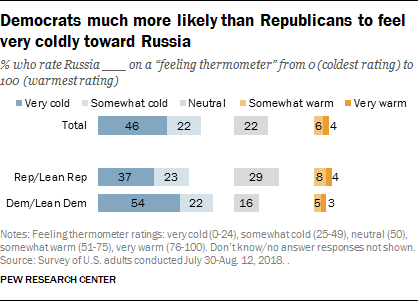
Overall, the public is decidedly cold toward Russia. Approximately two-thirds of Americans (67%) feel coldly toward Russia (rating it below 50 on the 0-to-100 scale), with nearly half (46%) saying they feel very coldly (rating it below 25).
A much larger share of Democrats than Republicans feel very coldly toward Russia – 54% of Democrats compared with just 37% of Republicans. Nearly identical shares in both parties say they feel somewhat coldly toward Russia (23% of Republicans; 22% of Democrats).
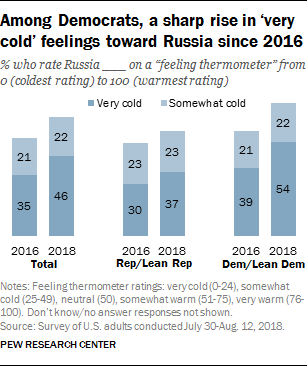
Republicans also are nearly twice as likely as Democrats to have neutral feelings toward Russia (29% of Republicans vs. 16% of Democrats). Relatively small shares in each party feel warmly toward Russia (12% of Republicans, 8% of Democrats).
Among members of both parties, especially Democrats, very cold feelings toward Russia have increased since 2016. Currently, more than half of Democrats (54%) give Russia very cold ratings, up 15 percentage points compared with two years ago. More Republicans also feel very coldly toward Russia but the change has been more modest (37% now, 30% then).
Republicans are colder than Democrats toward China, India
Republicans are more likely than Democrats to express cold feelings toward China and India. And while overall partisan views of Japan do not differ significantly, more Democrats than Republicans feel very warmly toward Japan.
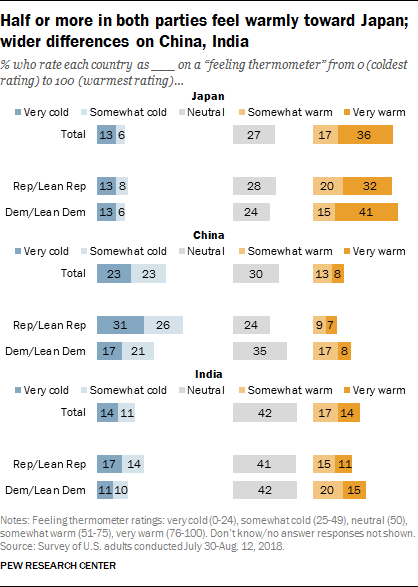
In views of China, far more Republicans give cold (57%) ratings than neutral (24%) or warm ratings (16%). Democrats’ views of China are more divided: 38% feel coldly, 35% have neutral feelings and 25% express warm feelings.
While comparable shares in both parties have neutral feelings about India (42% of Democrats, 41% of Republicans), more Republicans feel coldly toward India (31% vs. 21% of Democrats).
In both parties, half or more express warm feelings toward Japan. Democrats are 9 percentage points more likely than Republicans to feel very warm (41% vs. 32%).
No partisan differences in views of North Korea, sizable differences on Iran
Overall, a substantial majority of Americans (78%) feel very coldly (61%) or somewhat coldly (17%) toward North Korea. Just 6% of the public feels very warmly (3%) or somewhat warmly (4%).
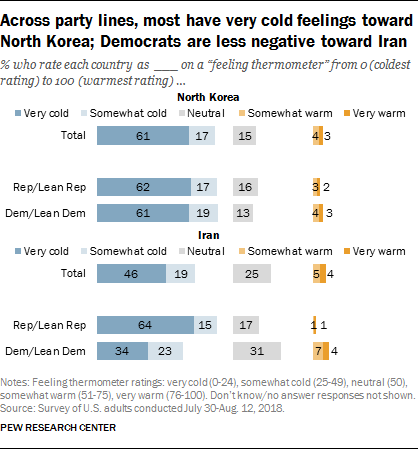
Partisans are in agreement in their sentiments toward North Korea; nearly identical shares of Republicans (62%) and Democrats (61%) express very cold feelings toward North Korea.
On Iran, by contrast, there are major differences. While majorities in both parties have cold feelings, these views are much more widespread – and more intensely negative – among Republicans. A 64% majority of Republicans have very cold feelings toward Iran, compared with only 34% of Democrats.
Wider partisan differences over Germany than Britain
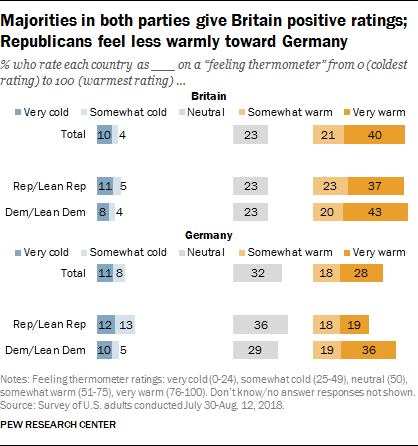
Republicans and Democrats are in general agreement on their feelings about Britain. Majorities in both parties (63% of Democrats and 59% of Republicans) feel warmly toward Britain, with about four-in-ten in both saying they feel very warmly.
These feelings are little changed since 2016, although Republicans are slightly less likely to feel very warmly toward Britain (46% in 2016, 37% now); Democrats are somewhat more likely to feel very warmly (37% in 2016, 43% now).
There are larger partisan differences in views of Germany. (For more on how Americans and Germans view relations between the two countries, see “Americans Say U.S.-German Relations Are in Good Shape, but Germans Disagree.”)
A 55% majority of Democrats express warm feelings toward Germany, compared with 37% of Republicans. Virtually all of the partisan difference in feelings toward Germany is in the share of those who feel very warmly: 36% of Democrats, compared with 19% of Republicans.